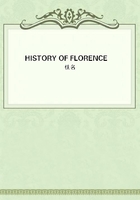
第40章
In the year 1340, new sources of disagreement arose. The great had two ways of increasing or preserving their power; the one, so to restrain the emborsation of magistrates, that the lot always fell upon themselves or their friends; the other, that having the election of the rectors, they were always favorable to their party. This second mode they considered of so great importance, that the ordinary rectors not being sufficient for them, they on some occasions elected a third, and at this time they had made an extraordinary appointment, under the title of captain of the guard, of Jacopo Gabrielli of Agobbio, and endowed him with unlimited authority over the citizens. This man, under the sanction of those who governed, committed constant outrages;and among those whom he injured were Piero de' Bardi and Bardo Frescobaldi. These being of the nobility, and naturally proud, could not endure that a stranger, supported by a few powerful men, should without cause injure them with impunity, and consequently entered into a conspiracy against him and those by whom he was supported. They were joined by many noble families, and some of the people, who were offended with the tyranny of those in power. Their plan was, that each should bring into his house a number of armed men, and on the morning after the day of All Saints, when almost all would be in the temples praying for their dead, they should take arms, kill the Capitano and those who were at the head of affairs, and then, with a new Signory and new ordinances, reform the government.
But, as the more a dangerous business is considered, the less willingly it is undertaken, it commonly happens, when there is any time allowed between the determining upon a perilous enterprise and its execution, that the conspiracy by one means or another becomes known. Andrea de' Bardi was one of the conspirators, and upon reconsideration of the matter, the fear of the punishment operated more powerfully upon him than the desire of revenge, and he disclosed the affair to Jacopo Alberti, his brother-in-law. Jacopo acquainted the Priors, and they informed the government. And as the danger was near, All Saints' day being just at hand, many citizens met together in the palace; and thinking their peril increased by delay, they insisted that the Signory should order the alarm to be rung, and called the people together in arms. Taldo Valori was at this time Gonfalonier, and Francesco Salviati one of the Signory, who, being relatives of the Bardi, were unwilling to summon the people with the bell, alleging as a reason that it is by no means well to assemble them in arms upon every slight occasion, for power put into the hands of an unrestrained multitude was never beneficial; that it is an easy matter to excite them to violence, but a difficult thing to restrain them; and that, therefore, it would be taking a more prudent course if they were to inquire into the truth of the affair, and punish the delinquents by the civil authority, than to attempt, upon a simple information, to correct it by such a tumultuous means, and thus hazard the safety of the city. None would listen to these remarks; the Signory were assailed with insolent behavior and indecent expressions, and compelled to sound the alarm, upon which the people presently assembled in arms. On the other hand, the Bardi and the Frescobaldi, finding themselves discovered, that they might conquer with glory or die without shame, armed themselves, in the hope that they would be able to defend that part of the city beyond the river, where their houses were situated; and they fortified the bridge in expectation of assistance, which they expected from the nobles and their friends in the country. Their design was frustrated by the people who, in common with themselves, occupied this part of the city; for these took arms in favor of the Signory, so that, seeing themselves thus circumstanced, they abandoned the bridges, and betook themselves to the street in which the Bardi resided, as being a stronger situation than any other; and this they defended with great bravery.
Jacopo d'Agobbio, knowing the whole conspiracy was directed against himself, in fear of death, terrified and vanquished, kept himself surrounded with forces near the palace of the Signory; but the other rectors, who were much less blamable, discovered greater courage, and especially the podesta or provost, whose name was Maffeo da Marradi.
He presented himself among the combatants without any fear, and passing the bridge of the Rubaconte amid the swords of the Bardi, made a sign that he wished to speak to them. Upon this, their reverence for the man, his noble demeanor, and the excellent qualities he was known to possess, caused an immediate cessation of the combat, and induced them to listen to him patiently. He very gravely, but without the use of any bitter or aggravating expressions, blamed their conspiracy, showed the danger they would incur if they still contended against the popular feeling, gave them reason to hope their complaints would be heard and mercifully considered, and promised that he himself would use his endeavors in their behalf. He then returned to the Signory, and implored them to spare the blood of the citizens, showing the impropriety of judging them unheard, and at length induced them to consent that the Bardi and the Frescobaldi, with their friends, should leave the city, and without impediment be allowed to retire to their castles. Upon their departure the people being again disarmed, the Signory proceeded against those only of the Bardi and Frescobaldi families who had taken arms. To lessen their power, they bought of the Bardi the castle of Mangona and that of Vernia; and enacted a law which provided that no citizen should be allowed to possess a castle or fortified place within twenty miles of Florence.